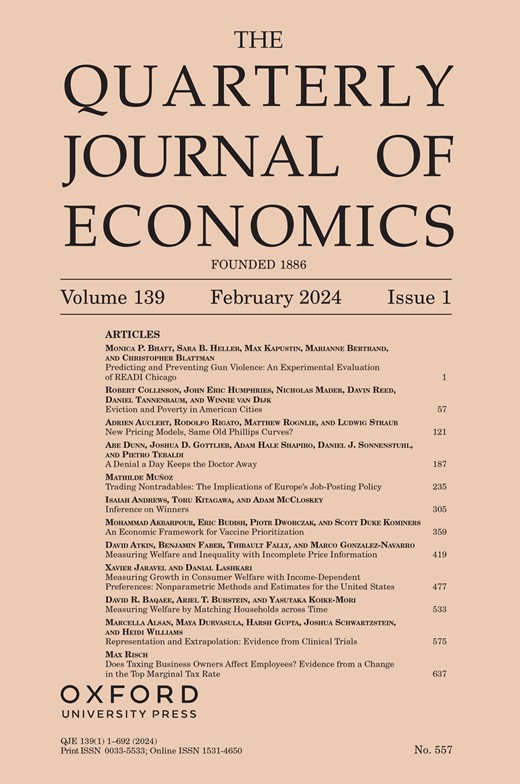最优空间策略、地理和排序*
IF 12.7
1区 经济学
Q1 ECONOMICS
引用次数: 27
摘要
我们研究了具有溢出效应和异质工人空间排序的量化贸易和地理框架下的最优空间政策。我们描述了必须保持有效分配的空间转移,以及可以实施这些转移的劳动力补贴。即使溢出效应在各个地区普遍存在,也存在提高福利的空间政策的空间。利用美国城市的数据和现有的溢出弹性估计,我们发现,将工人重新分配到目前的低工资城市将使美国经济受益。最优分配的特点是,与观察到的分配相比,小城市的高技能工人所占比例更大。低效的分拣可能会导致大量的福利成本。本文章由计算机程序翻译,如有差异,请以英文原文为准。
Optimal Spatial Policies, Geography, and Sorting*
We study optimal spatial policies in a quantitative trade and geography framework with spillovers and spatial sorting of heterogeneous workers. We characterize the spatial transfers that must hold in efficient allocations, as well as labor subsidies that can implement them. There exists scope for welfare-enhancing spatial policies even when spillovers are common across locations. Using data on U.S. cities and existing estimates of the spillover elasticities, we find that the U.S. economy would benefit from a reallocation of workers to currently low-wage cities. The optimal allocation features a greater share of high-skill workers in smaller cities relative to the observed allocation. Inefficient sorting may lead to substantial welfare costs.
求助全文
通过发布文献求助,成功后即可免费获取论文全文。
去求助
来源期刊

Quarterly Journal of Economics
ECONOMICS-
CiteScore
24.20
自引率
2.20%
发文量
42
期刊介绍:
The Quarterly Journal of Economics stands as the oldest professional journal of economics in the English language. Published under the editorial guidance of Harvard University's Department of Economics, it comprehensively covers all aspects of the field. Esteemed by professional and academic economists as well as students worldwide, QJE holds unparalleled value in the economic discourse.
 求助内容:
求助内容: 应助结果提醒方式:
应助结果提醒方式:


